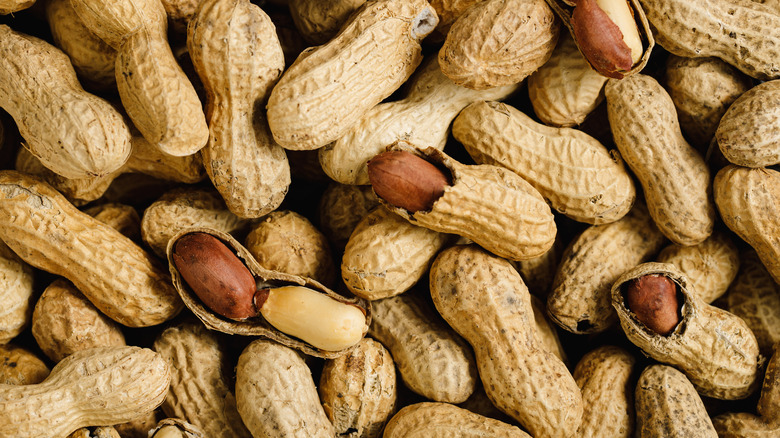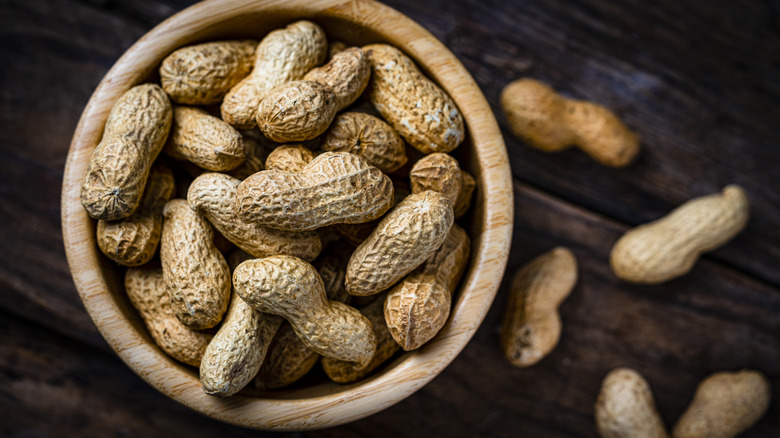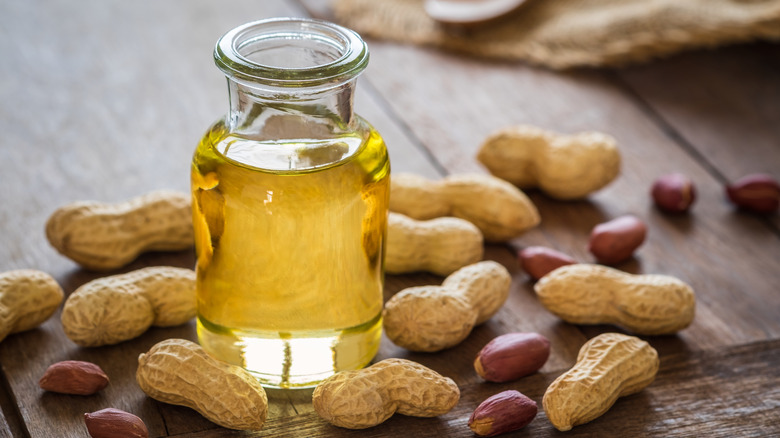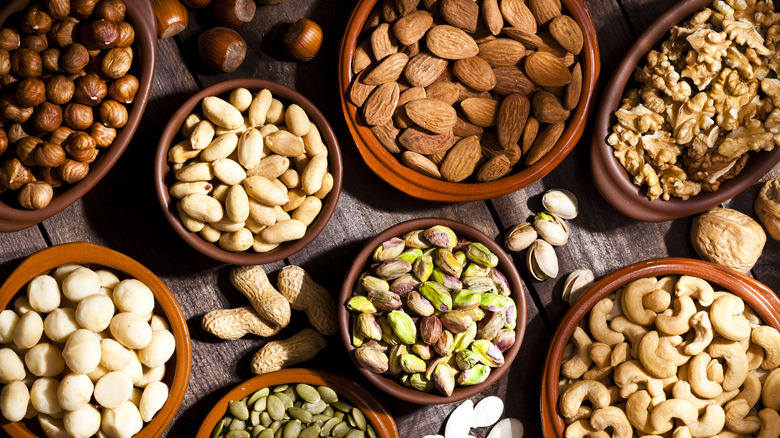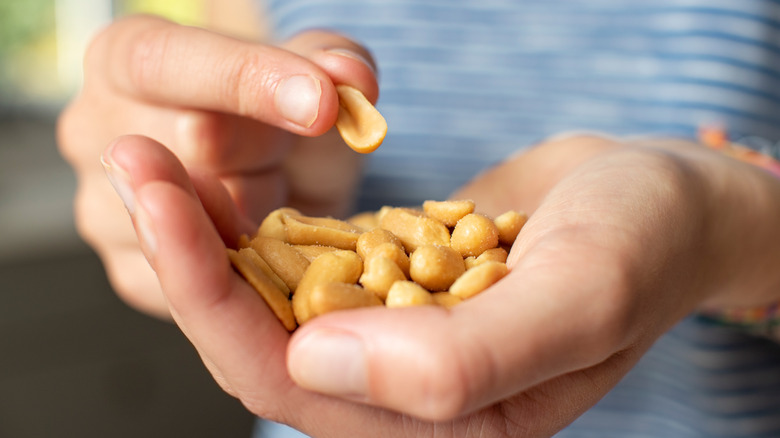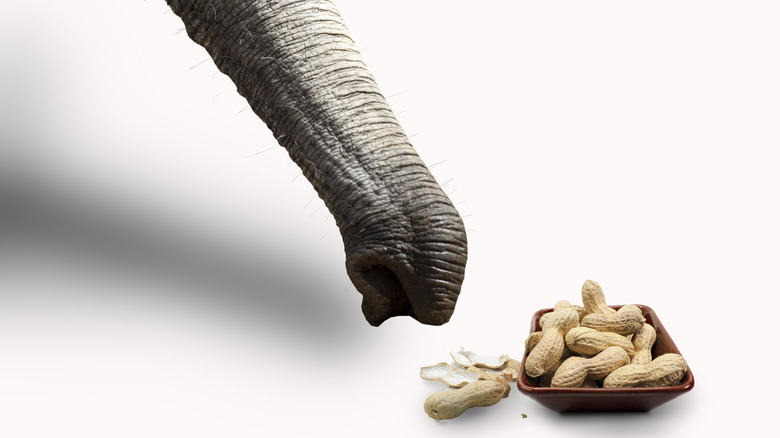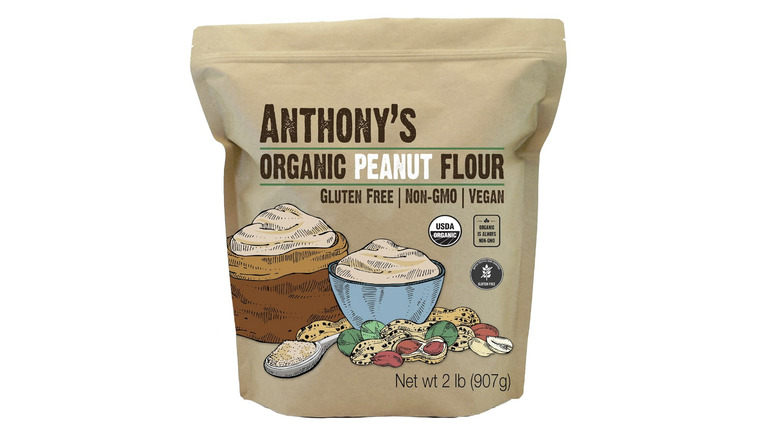False Facts About Peanuts You Thought Were True
We may receive a commission on purchases made from links.
Also known as groundnuts because they grow underground, peanuts possess a rich flavor that makes them an irresistible snack. Often roasted and salted, peanuts are commonly enjoyed as a snack straight out of the bowl. However, the appeal of peanuts doesn't stop there. The bar staple is also a key ingredient in a wide range of dishes and desserts, serving as an addition to both sweet and savory flavor profiles.
Beyond their culinary applications, peanuts also offer substantial nutritional benefits when consumed in moderation. This is because they are packed with healthy fats, protein, and various vitamins and minerals, many of which support heart health and overall well-being. Peanuts also contain high amounts of fiber and protein making them both filling and good for digestion.
Whether you enjoy peanuts regularly or only have them now and then, knowing the ins and outs of what you're eating is key. With this in mind, we're here to clear up any misconceptions about this common snack and debunk some popular myths about peanuts.
False: Peanuts are nuts
Did you ever think peanuts were just another type of nut? Surprise! They actually belong to the legume family, alongside peas and beans. Unlike true nuts, peanuts are seeds encased in pods that grow underground, and as such don't fall under the botanical definition of nuts.
In scientific terms, a nut is an edible seed encased in a hard shell that doesn't split open to release it, even once the plant matures — think chestnuts, acorns, and hazelnuts. Notably, almonds, cashews, and pistachios also don't make the cut as nuts. Instead, they're seeds from drupes, or fleshy fruits, which places them in the same family as mangos and peaches.
Much like tomatoes are classified as fruit and watermelons as berries, peanuts defy our conventional culinary categories. Even though they don't align with the precise botanical definition of a nut, we tend to categorize peanuts alongside nuts due to their similar flavor and culinary applications. Just like nuts, peanuts are commonly consumed as a snack and used as an ingredient in various confections and dishes.
False: Peanut oil is great for frying
Also sometimes called groundnut oil, peanut oil is a vegetable oil derived from peanuts. This oil is valued for its neutral taste and high smoke point of around 446 degrees Fahrenheit, making it a popular choice for frying, sautéing, and other forms of cooking. The smoke point of an oil is the temperature at which it begins to break down and produce smoke, as well as potentially harmful substances, such as free radicals and acrolein.
While the smoke point of peanut oil may indeed be on the high end of the spectrum, this doesn't necessarily mean that it's suitable for cooking on high heat. When selecting cooking oils for high-heat applications, another important factor to consider is oxidation, a reaction that can occur when oil reacts with oxygen. Peanut oil contains high levels of unsaturated fatty acids, making it more likely to undergo oxidation when heated. This, in turn, can lead to unpleasant aroma and flavor, as well as the formation of harmful compounds associated with health issues such as heart disease, diabetes, and even cancer.
False: Peanuts aren't as good for you as other nuts
Given that peanuts tend to be cheaper than other nuts, they are sometimes perceived as nutritionally inferior. In reality, the bar staple is every bit as good for you as their pricier counterparts such as almonds and cashews. And the health benefits are definitely substantial. A 2015 study featured in JAMA Internal Medicine found that over 200,000 people who consumed peanuts and other nuts on a regular basis had a significantly lower risk of dying from any cause, including heart disease.
So what's so great about peanuts? The legume stands out as an affordable and nutritious addition to any diet due to its high protein, healthy fat, and nutrient content. Peanuts are abundant in monounsaturated and polyunsaturated fats, which are critical to maintaining heart health. They are also a treasure trove of antioxidants, iron, and magnesium, and are rich in fiber and protein. Nevertheless, since different nuts have different nutritional profiles, to maximize their health benefits it's best to consume peanuts with a mix of other nuts.
False: Peanuts are fattening
While their robust nutrient content makes peanuts an excellent addition to a healthy diet, many are concerned about their fat and calorie content. In reality, however, rather than leading to weight gain, moderate peanut consumption might actually contribute to weight management and even weight loss. For instance, a study published in the Journal of Nutrition found no correlation between nut consumption and weight gain. Meanwhile, another research published by Nutrition Research actually found a link between peanut consumption and weight management in adolescents.
Despite their relatively high fat content, peanuts predominantly contain healthy fats, such as monounsaturated and polyunsaturated fats. These fats can enhance feelings of fullness and may lower overall calorie intake throughout the day. Additionally, peanuts contain relatively high levels of protein and fiber, two nutrients known for their role in promoting satiety. Finally, while peanuts are high in calories, they aren't as easy to chew and physically break down as some other foods, likely leading to lower calorie absorption.
False: People with a peanut allergy cannot come into any contact with peanuts
Based on the information provided by the Asthma and Allergy Foundation of America, milk is the leading allergen among children, with eggs and peanuts also highly prevalent. Among adults, shellfish stand out as the most concerning allergen, followed by peanuts and tree nuts. Allergic reactions to peanuts are most often triggered by direct consumption of peanuts or products that contain peanuts, such as peanut butter. Reactions can also occur through cross-contamination where non-peanut foods come into contact with peanuts or peanut residues during processing, packaging, or serving.
Luckily, accidentally inhaling or touching peanuts is very unlikely to lead to an allergic response, even in sensitive individuals. It's important to note that the severity of peanut allergies can vary, and for some, even minimal exposure to peanut particles or residue can cause a reaction. However, Edwin Kim, an allergist and chief of the Division of Pediatric Allergy-Immunology at the UNC School of Medicine, explains in an interview with UNC Health Talk that this is unlikely to be severe. "If the person who sat in an airplane seat before you happened to eat peanuts and was not very clean, you could potentially touch it in a chair and have a little bit of a rash or irritation," he says.
False: Young children shouldn't consume peanuts
The idea that peanuts are inherently dangerous to young children stems from concerns about allergies. Some schools in the U.S. have even implemented a "nut-free" policy to reassure parents and protect students. And there is cause for concern. According to research by the American College of Allergy, Asthma, and Immunology, peanut allergies among children increased by 21% in the seven years between 2010 and 2017.
While the rise in peanut allergies has prompted many parents to take the product off their children's menu, research shows that exposing young children to peanuts may be beneficial. More specifically, it may help prevent the development of peanut allergies down the line. That said, it's important to remember that whole peanuts constitute a choking hazard and shouldn't be given to children under five years of age. Instead, peanut butter and peanut biscuits can be safe alternatives. It also goes without saying that parents of children at risk of peanut allergies should consult a medical practitioner before feeding their kids peanut-based products.
False: Peanuts are only good as a snack
There's no doubt that peanuts make a great snack. Not only are they healthy but they are also incredibly budget-friendly and versatile, easily fitting into a variety of dietary preferences. As a snack, peanuts are available in a variety of forms. They can be enjoyed in their natural state, roasted, or fried. Additionally, peanuts can be granulated, chopped, ground into flour, or transformed into products like peanut butter, oil, or extract.
Beyond their status as a popular snack, peanuts enjoy global recognition as a versatile ingredient in culinary traditions around the world. After all, who could resist a pad thai topped with crushed peanuts? In the States, peanuts are often incorporated into desserts like peanut butter cookies, peanut brittle, and peanut pies, showcasing their ability to complement sweet flavors. Peanuts are also frequently incorporated into savory recipes, such as West African chicken stew, smoky peanut butter chili, and peanut butter pork curry.
False: Elephants love peanuts
While the idea that elephants love peanuts may be endearing, it's more fiction than fact. Nevertheless, over the years, this largely unfounded piece of folklore has been popularized through cartoons and children's stories. A case in point is the animated Disney film "Dumbo," which features a young elephant with a fondness for peanuts. Moreover, historically, circuses and zoos across the U.S. would sell peanut bags to visitors, who would then feed the nuts to the elephants, further promoting the false belief that peanuts are a preferred snack of these large mammals.
Contrary to popular belief, peanuts are not a natural part of an elephant's diet. Instead, in their natural habitats, elephants feed on a diverse menu of grasses, fruits, leaves, and tree bark. Since elephants weigh around 7 tons, they require a substantial amount of food to sustain their energy needs. In fact, an adult elephant consumes around 300 pounds of food daily, making the idea of a peanut-based diet highly impractical.
False: Peanuts contain gluten
It's no secret that supermarket nibbles often contain gluten. A protein found in wheat, rye, and barley, gluten is a popular ingredient in processed snacks due to its ability to improve product texture. Just a few of the snacks that frequently contain gluten include cakes, pies, cookies, and crackers. Luckily, peanuts — like other nuts — in their unprocessed form don't fall into this category and are perfectly safe for those with celiac disease and gluten sensitivity. This doesn't refer to flavored nuts, nut mixes that contain a variety of ingredients, and nuts bought from bulk bins — all of which may be contaminated by gluten.
Just like whole peanuts, both peanut flour and peanut butter in their pure form don't contain gluten. This being said, it's always crucial to check the label on any products that you're purchasing. This is because peanut flour and peanut butter may contain added ingredients or be manufactured in facilities that process gluten-containing products, posing a risk of cross-contamination.
